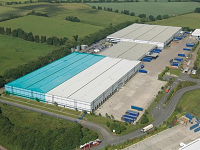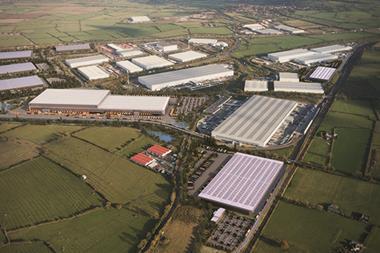On 27 April, Property Week’s Sheds Conference returns, eight years after the last one, in the depths of the worst property downturn of the past 35 years.

In those days, sheds had muscular marketing names like ‘Magnum’, the biggest speculative developments were badges of honour, banks were falling over themselves to lend… and then the music stopped.
Through the mid-2000s, enormous leverage and cheap money fuelled a nationwide sheds boom.
Then, after Lehman Brothers triggered the credit crunch, not only did the debt dry up, the subsequent recession choked off demand for sheds.
Demand for warehouses had largely been centred on a small group of mainly food retailers, led by Tesco, and when it and the other supermarkets retrenched, the market was on its knees.
Now, as the Sheds Conference marks its return, the picture couldn’t be more different.
In 2016, according to the latest e-Retail Sales Index from Capgemini and IMRG, online retail sales in the UK topped £133bn - a staggering jump of 16% on 2015.

A decade ago, the Royal Mail was the main carrier of parcels in the UK. Now, players such as DHL Express, DPD, UPS and FedEx predominate, showing how the customer base has been overhauled with the advance of the internet.
Other types of retail format are driving demand too, with convenience and discount retailers also rethinking their supply chains in the light of ever-changing shopping habits.
Globalisation of industrial real estate is having a significant impact: occupationally, with the rise of giants such as Amazon transforming the sector; and, as a source of capital, international investors like GIC and Blackstone are attracted to the sheds world.
Industrial will remain the strongest sector until 2019. With the rate of growth we’re seeing in the sector, maybe that will extend to 2025!
The supply chain hierarchy has been completely re-engineered. ‘Big boxes’ have got bigger and higher and now stock in-store and online stock-keeping units, while cross-dock warehouses operating as last-mile delivery centres in urban locations have become a recognised sub-type that simply didn’t exist 10 years ago.
The supply of both is now extremely limited, with less than six months’ availability widely quoted.
Sheds of the future
So what will we be talking about at the Sheds Conference in another eight years, in 2025?
We will undoubtedly have seen the continued rise of ecommerce, and it is crucial that metropolitan centres now cater for the likely explosive growth in deliveries in and around their conurbations. At SEGRO, we highlighted the risks of losing industrial land, particularly in the capital, in our ‘Keep London Working’ report published in February. Industrial land is being lost in London at five times the rate it should be. This trend is being repeated in other metropolitan centres. In 2025, will we be saying there’s nothing left?
By that date, there will also have been continued urbanisation, more city living and consequently more congestion of an infrastructure already under strain.

Alternative, cleaner fuels will have been regulated if not adopted by then. The increasing use of low-noise electronic vehicles will enable more late-night deliveries, making warehouses more compatible with residential development. The necessary use of scarce land will probably also have made multi-storey warehouses more prevalent.
Outside cities, autonomous vehicles may have expanded the footprint of the Midlands ‘Golden Triangle’ as vehicles would be able to cover more miles without drivers having to take breaks. And automation and robotics will increase productivity and complement the need for increasingly skilled jobs in logistics as management of the ecommerce supply chain becomes more complex and technical.
JLL forecasts that industrial real estate will not only deliver the highest total return of all the commercial sectors this year but that it will also remain the strongest-performing sector until 2019. With the rate of growth we’re seeing in the sector, maybe that will extend to 2025! All of us at Sheds would drink to that.






























No comments yet